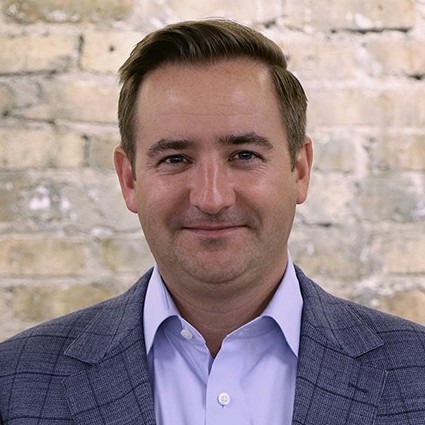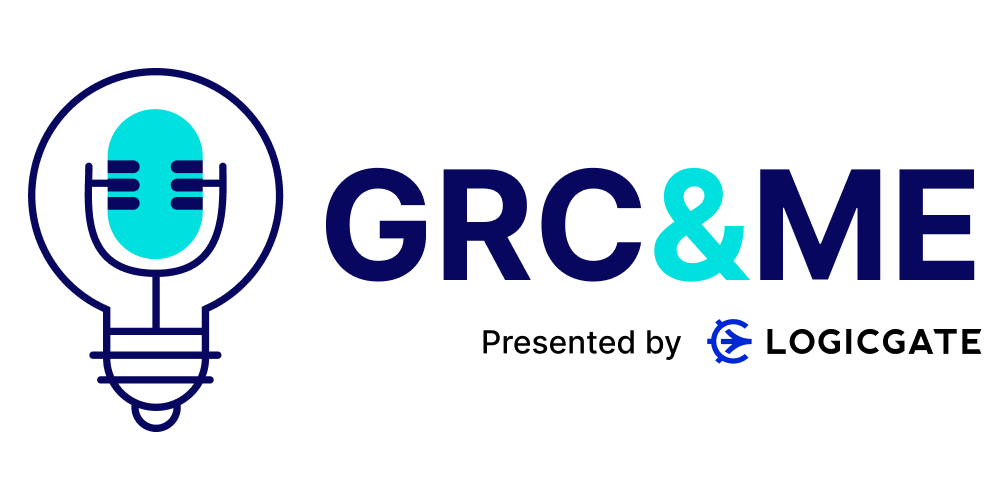Prices Are Rising. How to Prepare for Inflation Now & Later.
- 0.5
- 1
- 1.25
- 1.5
- 1.75
- 2
Megan Phee: Hi, I'm Megan Phee, and this is GRC& Me, where we interview industry thought leaders in governance, risk, and compliance on hot topics, industry- specific challenges, trends, and more, learn about their methods, solutions, and outlook in this space.
Matt Kunkel: Hello everyone. And welcome to another episode of GRC& Me. I am your guest host today, Matt Kunkel, one of the co- founders and the CEO at LogicGate. And today I have a special guest with me, John Hotchkiss, who is the Chief Risk Officer of Fairway Independent Mortgage Company. John, thanks for being on. Great to have you.
John Hotchkiss: My pleasure. Thanks for inviting me.
Matt Kunkel: Well, John, can you start by just giving us a little bit of background on yourself for our listeners?
John Hotchkiss: Sure. Gosh, a little bit. I'll try to make it brief, I have a lot of background. I oversee the enterprise risk organization here at Fairway Independent Mortgage. This includes operational risk, quality control, internal audit, reporting and analytics, strategic asset management, and risk management. Basically, my team ensures that Fairway monitors and mitigates any risk that may challenge the company. I also work very closely with our other department leaders to help them create policies and procedures designed to mitigate risk. I've been with Fairway now for almost six years. Prior to Fairway, I was with Fannie Mae for 17 years in a variety of roles, including credit risk, multicultural lending, and marketing. And I really started off in this industry when I was 15 years old working for my dad's mortgage brokerage firm in the northern suburbs of Chicago. So that kind of brings you up to speed on my background.
Matt Kunkel: You've done it for quite some time. I love it.
John Hotchkiss: Yes. You know, I hate to age myself, but yeah, just about 35 years I've been in the industry.
Matt Kunkel: Love it. Well, it's great to have you on. We've got a fun topic today and I think a very timely topic that we're going to talk a little bit about, inflation and potential inflation risk and a potential recession that's on the hand and kind of how that's affecting the risk landscape within your world at Fairway and the broader mortgage world. So, obviously, there's been a ton of talk about inflation, the Fed just rates another 75 basis points yesterday. So what are you currently hearing and seeing as it relates to the mortgage industry and, frankly, the impact on the larger economy?
John Hotchkiss: Yeah, sure. Digging in on the mortgage industry, really what we're seeing is, of course, the rising rates. We are also seeing a rise in value due to supply around inventory. I want to highlight a couple of periods in time. One is going to be back in December of 2020, the other is going to be current. Okay? So there's two things that are going on right now with housing. One is interest rates. If you look back... And the reason I chose December of 2020 is that's when the rates were at their all- time low, and that's when the treasury was buying mortgage bonds and really driving the rates low to help stem off all of the disruption caused by COVID. Rates at that point in time, on a 30- year fix, were at about a 2. 7%. Okay? If we think about where they were, I'm going to say yesterday morning because I didn't factor in the interest rate boost from yesterday, but most of that was already built into the market anyway, they were anticipating the 75 basis points increase there, but those rates were at about 5. 23% for the same product that's already year fixed. When you look at that, that's a difference in interest rate of over 2.5%, and when you look at that in terms of an overall percentage, that's a 95% increase between December 2020 to May 2022 in interest rate. That's just incredible. If you watch the news, they talk about how the rate of inflation has been at a high that it hasn't been in 40 years and you hear a lot of noise about that. That's just ring. Okay? So let's take a look at the same time period, and let's talk about the median sales price of a home. So if you look back to December 2020, the median sales price of a home was$358, 000. Where it is now, in May, is 428, that's the difference of about$70, 000. So there's been almost a 20% increase in the cost of housing now just because there's little supply there. For whatever reason, the post- COVID release of inventory hasn't happened, people are still sitting on their houses. During COVID the inventory really wasn't moving because of the fear of COVID because of the fear of walking through a listing and getting sick, that's eased but the release of those properties has not. We've seen a lot of people putting money into their existing homes instead of moving up to their move- up home, they're taking the home that they have and fixing that up and making that their new forever home. So the inflation we're seeing, it's more of a supply chain issue that's driving up the cost of everything, including housing. The issue is it's more of a supply issue, it's not really a demand issue. If we don't have an increased demand there's just really nothing out there. And about the inventory, it's currently disrupted. And what's unusual about that is it's very easily disrupted, a little change can keep things at the way they are, the rising gas prices, that certainly doesn't help anything. That's almost another way besides raising interest rates to control inflation.
Matt Kunkel: I totally agree with you. And that makes a ton of sense. I mean, we're seeing something similar in SaaS, right? A year ago, SaaS software as a service evaluations and software evaluations, were at the all- time high. The NASDAQ was at the all- time high. Some of the big SaaS players had just bonkers, bonkers valuations on what their earnings were. And over the last 12 months, a dramatic decrease in the NASDAQ and just privately- held SaaS companies came down. And I think a lot of that too has to do with the macro economy, right? Because how most private SaaS companies are funded is through private equity and venture capital, venture capital businesses are funded through LPs or limited partnerships, those limited partnerships, while some of them are big pension funds and things, but a lot of them are independent investors that are out there, high net worth individuals, and they're using this as another way to diversify their portfolio. Well, if their portfolio of stocks are shrinking dramatically, it's gone down about 30% since the start of the year, then they don't feel as wealthy, they're not going to invest in LPs, and then you get a shortage of supply, same thing, from a capital perspective to these companies, and then that shrinks down the overall valuations that these companies have. So I think we can all agree that there's definitely inflationary risk within all of the markets out there right now. But what do you think the government is doing to address these inflationary problems and what impact are you seeing on that within the mortgage industry?
John Hotchkiss: Sure. Great question. And you know, again, I'm going to do a little bit of a history lesson and just talk about where inflation has been, where it's at now, and where it's projected to be. Any given year, the government is happy with a 2% rate of inflation. So let's go back to COVID and let's talk about 2020. Inflation there ended at 1. 2% for the year. 2021, the economy's coming back, we have a lot of stimulus that's still out there and there's still plenty of opportunities in terms of employment. The unemployment rates are relatively low, they came back down. If you look at 2020, unemployment was at about 8%, and in 2021 it went down to 5.4%. So when you look at inflation, starting off at 2020 at 1. 2, jumping to 6.7 in 2021, currently we're at a 8.6%, and where the Fed really wants us, as I mentioned, the sweet spot is 2. They are projecting with the interest rate, moves that they have planned for the future to end 2022 around 5.2%, 2023 around 2.5, and then 2024 back to a normalized market at 2%. And how do they do that? There's only one tool that they have in their toolbox to do that and that's the interest rates and that's what they're doing. And the 75 basis points increase that we saw yesterday, that's part of it. Again, I already mentioned, and everybody who's watching the news knows this, that inflation is the fastest it's been in 40 years. If you listen to certain economists for our industry, we'd like to listen to Mark Zandi, he's the Chief Economist for Moody's Analytics. A couple of weeks ago, he said we're pretty much in a position where there's a 50/ 50% chance that we're going to be in a recession in the next two years. So what does that mean? Well, you don't predict recessions, recessions are something you kind of do a look back and you look at the economy and we could be in the middle of one right now, we just know it until we have future data to examine it. We have more rate hikes to come, the Fed Chairman, Jerome Powell, has been very public on that. The next one that we're looking at is probably another half a percent. And if you think about what it does just to the normal American, the cost of inflation, the cost of gas, just everything that's happening right now, this year, the average American is paying between $460 to $800 more per month on the basic necessities. And that's touching every family's budget, that's groceries, that's gas, it's a number of things.
Matt Kunkel: Yeah. I've got a question for you inaudible ask a couple of CROs this, but do you all track inflation as a risk to your organization? Is it in your registry that you're tracking and you're saying yes or no? Or is it one of those things that it's like, "Hey yeah, it's inflation, it's coming up, but that cost, we can just pass on to our customers and that's how we'll get around this."?
John Hotchkiss: Yeah. Typically, you're right, it's the latter, it's more of a pass- through. When you think about interest rates, when interest rates go up, they go up across the board, there's nothing we can do to control that. I mean, that's the price of the market, those are the prices of the securities getting put out there. When that happens, the rates automatically get passed down to the consumers. We don't plan for it in our risk registry, we know it's just something that's natural. I think it would be difficult for most companies to kind of plan for that risk. I think it's just something, as you mentioned, you address as it happens and it's cost of goods going up.
Matt Kunkel: Yeah, exactly. And I think that's what we're broadly seeing across a lot of consumer products right now. So one more question for you, John, here. As we look at just the broad macro economy, what trends are you seeing out there?
John Hotchkiss: It's been crazy, right? Some sectors are getting beat up, others are doing well. Obviously, the gas companies, they just got picked on yesterday from the executive division and their profits and wanting to give back. But let's start off in, gosh, I hate to say it again, third time, history lesson. So COVID spawned nationwide shutdowns, and there's still shutdowns associated with COVID. Let's look at back in 2020 and the price of meat. Meat started shooting up because COVID was running through meat packaging plants and they had to shut down, right? Technology shortages around the world, we all highly rely on China for our technology and computer components and components for our auto industry. And they're still having shutdowns in China. They had some shutdowns just this week that are affecting technology and the price of goods. Vehicles, if you go to a new car lot right now and you look inside where they're supposed to have all their brand new cars that just rolled off the truck, they're used cars...
Matt Kunkel: Mm- hmm.
John Hotchkiss: ...in the dealership, in the showroom, and they are sparse cars in the lots. There's really a drive too in terms of pricing because, again, supply and demand. You're able to get more selling your used car, the auto industry is being able to make more. It used to be forever... we're both from Michigan, we know that auto prices, they always have some sort of concession, right? Some sort of deal. The deals are gone because they can't. The auto companies, their own finance companies have been able to raise rates before these other rates went up because they can't, there's just no supply. So we've seen a rise related to COVID around there. Let's talk about some of the emerging issues that we're seeing impacting shopping, and that's really around oil and fuel. If you look at food costs, those are up over 10% and a lot of that's related to the cost of shipping. Diesel gas fuel has doubled over the past couple of years. If you look at some of the micro disruptions that happen in the industry, let's talk about chickens, right? The cost of eggs and chickens has shot up, that's over more than the cost of food, food is up over 10%, that's almost 12% for chicken and eggs because of bird flu, right? So it's those little things that can impact things. One more big one to think about when you're thinking about fuel, the cost of fish. And let's talk about that with fuel, we have the cost of the fishermen going out on the boats to get the fish, you have the cost of the energy that uses fuel to keep the fish cold, you have the cost of the shipping, whether it be truck or airplane, however it gets to its final destination, fuel, fuel, fuel. So we have that's impacting it as well. Back to housing. Our housing costs are up 5.5% this year and expect it to go higher. And again, that's just because of the supply. Everybody's just still sitting under inventory. So fuel costs, that's a big thing. Those are up like 48% just for normal fuel, diesel, obviously, that's doubled. If you think about some of the things that impacted that, a couple of years ago, we slowed our production of oil in Alaska and we've halted exploration in some of our untapped lands. The war in Ukraine, obviously, has disrupted Russian oil across all of Europe, and that affects us as well because that affects the suppliers, the other suppliers so the cost is going up there. Also, the UAE, the United Arab Emirates, they have not ramped up oil production to meet the demand. So again, it's a gigantic supply issue that we're having that's really driving the inflation that we're seeing.
Matt Kunkel: John, you've highlighted just so many amazing examples there of why what you and other Chief Risk Officers, whether in mortgage or other industries, do day in and day out is so hyper, hyper critical to organizations, right? It's about being able to understand all of the existential risks, not just the easy ones that we all know about that are kind of the same, it's all of these existential risks that are only getting more critical. And the velocity of them is only growing more, right? 20 years ago, did people have climate change risk on their mind? Probably not. There's geopolitical risks, there's all these supply chain risk issues that you have out there. Were people thinking about gas prices as a risk as it relates to the supply chain of what they need to do to create in their products for organizations? So to me, what you've just done is highlight really the true importance of what the risk department does in an organization to protect it and understand these factors and how to mitigate against them, but also to give organizations that strategic advantage and say," Hey, these things are coming on the horizon, we need to plan, we need to prepare for this potential risk that could happen to our company." So I got one final question for you, John, before I let you go, this is a fun one. So here at LogicGate, we do something called Summer Fridays where we give our employees Friday afternoons off so they can spend time with their family, friends, four- legged friends, and just give them some mental health back in the day. What fun things are you planning on doing this summer?
John Hotchkiss: Oh, that's a great question. And I appreciate the fun that you guys have. So you know this, I'm from Ann Arbor, Michigan, my family's there, my best friends are there. With COVID we haven't been going there a lot, we haven't been getting out a lot as most folks have over the past couple of years, but we're getting out there now and we've been making a lot more trips back home to Ann Arbor. And just this last weekend... Or no, two weekends ago, I took my youngest fishing for the first time ever and he caught his first fish and he's fallen in love with fishing. And it's so fun watching him. I hope next time that I take him out that he gets to take the hook out of the fish himself, but that was daddy duty that day. So to answer your question, my fun thing that I'll be doing is getting this fishing hat back on, grabbing Emerson, he's my 11- year- old, and grabbing the rods, and we're going to be doing a lot of fishing this summer.
Matt Kunkel: I love it, John. Hopefully, you catch a big one on the Huron River. That's great. Well, hey, thank you so much, my friend, I appreciate you being on the show with me. And for GRC& Me, my name is Matt Kunkel, and remember to risk with confidence.
John Hotchkiss: Thanks, Matt.
DESCRIPTION
With prices increasing across the board, it is getting harder to avoid inflation's risk and a potential recession. In this episode, LogicGate CEO Host Matt Kunkel sits down with John Hotchkiss, Fairway Independent Mortgage Company's Chief Risk Officer. Join us as Matt and John look at how inflation will affect the risk landscape and how best to prepare.
Today's Guests

John Hotchkiss


